
Booze, Sailors & Health Menu: 1 2 3 4 5 6 7 8 9 10 11 12 13 14 15 16 17 18 19 Next>>
Booze, Sailors, Pirates and Health In the Golden Age of Piracy, Page 19
Alcohol and Health - Detrimental
“A long course of Ebriety [drunkenness] will not only distemper Body, but weaken the Understanding, carrying men to Hypochondriacism and Stupidity, intimated by the present Operation of strong Liquor in every drunken Fit; Men being put in a State of Forgetfulness, Childishness, and Impotency for the Time, of which Melancholy and Idiocy is only a farther
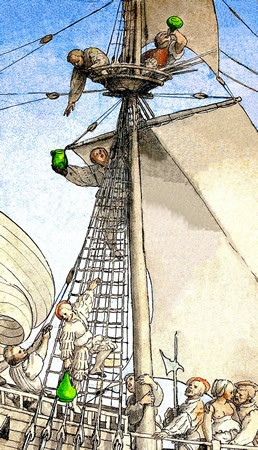
Artist: Hans Holbein the Younger
Drinking on a Ship, From Ship With Revelling
Sailors (1532-3)
Consequence, a Debility of the Brain. The Drunkard and Voluptuous, if they live long enough, habitually fixing that Weakness of Mind and Body, that were by Intermissions in their temporary Surfeits; Apoplexies [unconsciousness] from this Cause, are sometimes only an earlier Punishment, but commonly leave a Weakness both on the Mind and Body.” (John Atkins, The Navy Surgeon, 1742, p. 319)
While some medical professionals found the use of alcohol healthy and beneficial, others did not. In addition to the above comment, sea surgeon Atkins listed several things that could prevent the men from becoming ill which included keeping the sailors "restrained from Drunkenness where Temptations present... [such things are often] too much overlooked and disregarded, though of the greatest Consequence to preserve a Ship’s Company on a Voyage."1
Physician Tobias Venner had much to say on this topic. He began by examining the idea promoted by others that drinking induced sleep and quieted the 'animall powers' by causing vomiting, urination and sweat so that "the evill humours [are] not onely ejected from the stomack, but also expelled from all parts of the body."2 Venner rejected this idea, explaining that "drunkennesse spoyleth the stomack, maketh the bloud waterish [something Moyle also mentioned], hurteth the braine, dulleth the senses, destroyeth the understanding, debilitateth the sinewes, and subverteth the powers of all the body. Wherefore seeing that all drunkennesse is evill, and hurtfull to the true health of the body, and that the disease is pernicious"3. He further points out that "Drunkards verily doe not enjoy sweet and quiet sleep, whereby the animall powers are truly refreshed. In like manner, to procure vomiting, urine and sweat, by means of drunkennesse, as it is wicked, so it is also beastly."4 He finishes his diatribe, "In a word, it doth by much more hurt all the parts and faculties of the body, than any way help by evacuation of the superfluities [unwanted humors], as the barbarous Authors pretend for their assertion: for infinite are the hurts that drunkennesse bringeth unto mans body."5
Over-indulgence in distilled medicines (sometimes called 'physic') was likewise advised against.
Artist: Adriaen Brouwer
Drunken Men Revelling, From Peasant Feast (1625-6)
Writer Richard Younge, whose views we have already met with in a previous section, warned that "if Physick be taken too oft, it will not work like Physick: but nature entertains it as a friend, not as a Physician. Yea, poyson by a familiar use becomes natural food."6
Even the powers that be recognized the danger inherent in too frequent drinking and drunkenness. In 1728, shortly after the end of the golden age of piracy, Parliament passed an act to restrict drinking distilled alcohols. The act explained that "the drinking of Spirits…is become very common amongst the People of inferior Rank, and the constant and excessive Use thereof tends greatly to the Destruction of their Healths, enervating them, and rendring them unfit for useful Labour, and Service, intoxicating them, and debauching their Morals."7(Fortunately the problem only affected the 'People of inferior Rank', which certainly would have included sailors. Naval officers were apparently immune to the deleterious effects of distilled liquors in Parliament's view.)
Despite doling out a daily dose of alcoholic beverages in one form or another to their sailors, even the Navy brass eventually recognized the problem of drunkenness. When Vice-Admiral Edward Vernon codified the use of grog (watered down rum) in 1742, his purpose was not to make sure each sailor got his daily allotment of rum, but to prevent drunkenness among the crew. As Vernon explained in the order which implemented this policy,
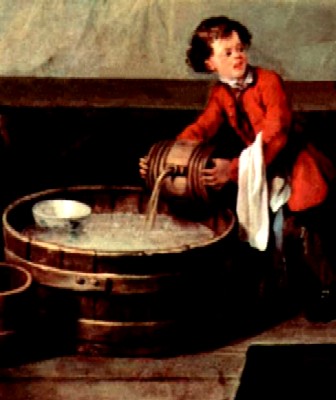
Artist: William Hogarth
From An Election Entertainment, Humors of an Election (1755)
my general order of the 4th of August, to be the unanimous opinion of both Captains and Surgeons that the pernicious custom of the seamen drinking their allowance of rum in drams, and often at once, is attended with many fatal effects to their morals as well as their health, which are visibly impaired thereby, and many of their lives shortened by it, besides the ill consequences arising from stupifying their rational qualities which makes them needlessly slaves to every brutish passion, and which having their unanimous opinion cannot be better remedied than by the ordering their half pint of rum to be daily mixed with a quart of water, which they that are good husbands may from the savings of their salt provisions and bread. Purchase sugar and limes to make more palatable to them.
...take particular care that Rum be no longer served in any species to any of the Ship’s company under your command, but that their respective daily allowance of half a pint [of rum] a man for all your Officer’s and Ship’s company be every day mixed in one scuttled butt kept for that purpose, and to be done upon deck, and in the presence of the Lieutenant of the watch, who is to take particular care to see that the men are not defrauded in having their full allowance of Rum, and when so mixed it is to be served to them at two servings in the day, the one between the hours of 10 and 12 in the morning, and the other between four and six in the afternoon. And you are to take care to have other scuttled butts to air and sweeten their water for their drinking at other times, and to give strict charge to your lieutenants in their respective watches to be very careful to prevent any Rum or other spirituous liquors being privately conveyed on board the ship by your own boats...8
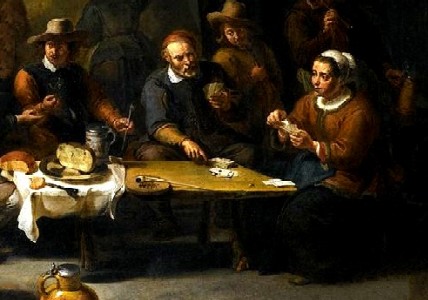
Artist: Willem van Herp - Moderate Drinking in a Tavern (1660s)
Although the above comments tend to oppose alcohol, most of these detractors were focused on over-indulgence rather than complete abstinence. Although Vernon disliked drunkenness, he was not opposed to giving navymen their daily tot; he was just opposed to giving it to them straight. Even the outspoken physician Venner was not entirely opposed to alcohol. He elsewhere advises the reader to "let Wine be moderately used, that nether distillation, nor inflammation, nor exciccation [dryness], or drunkennesse follow; for if it be taken beyond measure, it will not be a remedy & comfort for the strength, but rather a poyson and utter over-throw."9
The key was moderation. In this way, most of these opinions are not all that different from the proponents of alcohol's effects on health. Even the promoters of medicinal liqueurs only advised giving a very small amount to patients.
1 John Atkins, The Navy Surgeon, 1742, p. 354; 2,3 Tobias Venner, Via Recta ad Vitam Longam, 1638, p. 42; 4,5 Venner, p. 43; 6 Richard Younge, A sovereign antidote, 1664, p. 8; 7 Emily Cockayne, Hubbub: Filth, Noise, and Stench in England, 1600-1770, 2007, p. 45; 8 Quoted by L.G. Carr Laughton, “Document: Grog”, The Marinier’s Mirror, Vol. V., No. 3, September 1919, p. 89-90; 9 Venner, p. 43
Alcohol and Health - Detrimental: Alcoholism, Delirium Tremens and Simple Surfeits
A variety of modern health problems associated directly with overuse of alcohol are mentioned in the period health literature. Although the term 'delirium tremens' doesn't appear until the early nineteenth century and 'alcoholism' doesn't occur until the middle of it, there was some recognition of these things during the golden age of piracy. One health problem that was discussed was a surfeit, a problem caused by over-indulgence in either food or alcohol. Let's look at these ideas as they are found in the seventeenth and eighteenth centuries.
Alcoholism was recognized, if not entirely understood during the golden age of piracy. In the late 17th century, German surgeon Johann Dietz noted that the ship's cooper on a Dutch whaling vessel became ill and 'must inevitably have died' if something was not done.
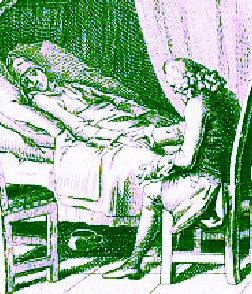
From Elementarwerke fur die Jugend und ihre
Freunde, p. 37 (1774)
At last I bethought myself, and asked whether he had no more brandy? He drew a deep sigh, and answered, 'No.' - 'Ha,' said I, 'now I know what your illness is.' I went out and brought him a small glass of my own brandy, which he drank with great eagerness. The commander asked me why I could not help the cooper? - I told him that his brandy was finished and his brandy was his sickness. -'Well,' he said, 'if that is what is wanted I will give you a flask so you can dose him with it, but he must not drink it all down at once; for I have need of it.' This was done, and my cooper was soon well again! By this one may see what habit will do.1
Physician William Cockburn told of a Navy ship's surgeon who was "was taken ill of a Loss of Appetite; he could not sleep; he had a great Drought; he sweat abundantly in the. Night; he was very lean, and dried up, and had great Reachings to vomit, especially in a Morning, brought up a frothy Substance only, and sometimes it was watery."2 He explained that such symptoms, particularly the vomiting, "are commonly produced by drinking Brandy, and spirituous Liquors."3 Cockburn advised the surgeon to drink milk and water gruel (and stop drinking alcoholic beverages) for a month during which he "recover'd sensibly every day."4 It may have been the first recorded alcohol recovery routine.
While voyaging in the Caribbean, physician Hans Sloane mentioned a variety of cases he treated which he felt were
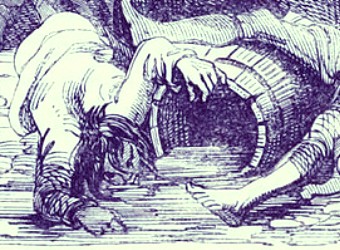
From Master Humphrey's Clock, Vol, 3 (1843)
caused by people who were "much given to drinking Rum Punch"5. The symptoms Sloane mentions are very similar to what Cockburn described. In one case, the symptoms mentioned to Sloane by the patient was "Belly-ach, by which he had lost the use of his Limbs... want of Appetite... a squeamishness or inclination to Vomit, a
very great Paralytick shaking all over him, and was very weak."6 In another case, a physician "of a yellowish swarthy Complexion was a great Drinker of Rum-Punch, and told me that he had had Twenty five several violent Fits of the Belly-ach, with drinking that sort of Liquor."7 A third case he discussed included similar symptoms caused by a "Distemper by drinking Rum- Punch, others by other Causes."8 In still another case a man "much given to drinking Rum-Punch, and strong Liquors, fell into a Fever, which chiefly seiz'd his Head, so that he was in a very great rage."9 The similarity of symptoms between these various cases is interesting. Among the physical symptoms of alcohol withdrawal mentioned by the Mayo Clinic are "sweating, rapid heartbeat, hand tremors, problems sleeping, nausea and vomiting, hallucinations, restlessness and agitation, anxiety, and occasionally seizures."10
Not surprisingly, Sloane's views and cures for this problem tend to have a humoral basis. In one case, he noted that 'several Clisters [clysters - enemas] and Purgers [emetics], which, although they wrought well, yet cur'd him not, but gave only a small momentary relief."11 Such attempts to empty the digestive tract of the body were used to purge unwanted humors thought to reside there. Since they weren't working, Sloane chose to treat the stomach pains with an external

Photo: Wiki User Zeigler175 - Senna Leaves
medicine, Oil of Amber, and Ammonium Chloride. He also prescribed internal remedies.
I chang' d the Medicines as occasion required, sometimes he took one Ounce of Sena boil'd in Chicken-Broath, and drank after it a Gallon or two in a day, to endeavour the washing away of any sharp or sower Humour lying and corroding the Coats of the Guts. For the same purpose he would at my desire drink huge Draughts, and often of thin Watergruel, lest the Chicken Broath should inflame too much12
Not liking the regime, the patient sought a second opinion and was given an opiate medicine. He eventually died as a result.
In a second case, Sloane gave the patient a variety of purging medicines including Pilulæ Cochiæ, Pilulæ Rudii, Powdered Scammony and the diuretic Jalap. He explained that "after the working of purging Physick, there are voided Pellets like Sheeps Dung, as hard as Stones, after which comes ease, and then violent pains, whence a necessity of taking Physick, and then the like Balls or Pellets again."13 Of course, if the problem identified was truly late-stage alcoholism, none of these remedies would have had any lasting effect. However, period physicians and surgeons appear to have had little understanding of the root problem.
Physician Tobias Venner identified several symptoms of illness that he associated with excess drinking which sound very much like delirium tremens. He mentions that post-alcohol consumption "disturbeth the reason, dulleth the understanding, confoundeth the memory, causeth the Lethargie, Palsie [paralysis and involuntary tremors], trembling of the hands, and a general weaknesse of the sinewes"14. Symptoms of delirium tremens recognized today include "sudden severe confusion, body tremors, mental function changes, agitation or irritability or stupor, sleepiness and fatigue"15. The parallels are notable.
Another problem that physicians and surgeons discussed which they said could result from excess imbibing was a surfeit.
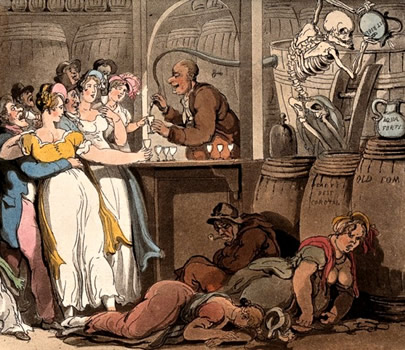
Artist: Thomas Rowlandson
The Dram Shop, From The Dance of Death Series, Wellcome Collection (1816)
Ephraim Chambers defined a surfeit as "an Indisposition caus'd by Excess in Eating or Drinking, that is, by over-charging the Stomach. It is usually attended with Eruptions [skin outbreaks or rashes], and sometimes with Fever."16 Surfeits are sometimes mistakenly thought to refer to hangovers by modern authors. However, this definition clearly points to something a bit more serious.
In the section about punch where the origins of the beverage were discussed, you may recall a letter written by Richard Addams to a Mr. Colley upon his stationing in Bengal by the East India Company warning him not to drink punch. "Evidently poor Mr. Colley- a rather sporty youth from London, it appears from the scant notices we have of his life- did not choose to heed Richard Addams's advice [against drinking punch while in India], and he probably should have: he died on August twenty-fifth, less than four months after he set foot in Bengal."17 Several other men died around the same time from the same problem. "'The Chiefe Occasion of this disease,' one of the company's captains reported to his bosses in London, 'is doubtless Intemperancy ...for 'tis a place that abounds with Racke [arrack] and ffruit [sic], and these immoderately taken Cannot Chuse but ingender Surfeits.'"18
Surgeon John Moyle included a whole chapter on dealing with different types of surfeits in his book written for sea surgeons.
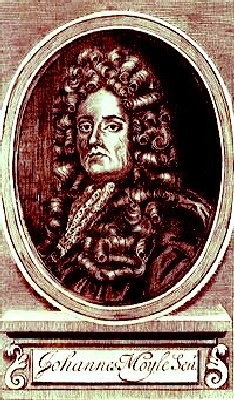
Sea Surgeon John Moyle
Moyle divided the problem into two basic types: mild and severe. (He doesn't call them by these names, those labels are assigned by the author based on Moyle's descriptions.) The severe type of surfeit sounds more like an illness and since it involves the surgeon to take an active role in its cure via humoral treatments, it will be discussed in the next section. However, the milder sorts fit here.
Moyle commented that surfeits "often fall out in Ships and Armies as well as in other places"19. He mentions a number of causes for surfeits including "excess in Drunkenness, or over eating of some vitious aliment [vicious food]; or else by too violent Labour, or Travel, that over heats the Blood, and melts the Unctuous [oily or greasy] substance in the Body."20 He explains that when excess food or drink is the cause, "if digestion be made in the Ventricle [meaning hollow cavity - referring here to the stomach] and first passages [of the digestive tract - likely referring to the large intestine], and that the Chyle turns into choler."21 We have already seen that chyle is believed to be the product of the first digestion of food. Choler refers to the bodily humor yellow bile, which is created from the conversion of chyle in the fourth digestion and thought to be then stored in the gall bladder.
Moyle explains that a surfeit is typically accompanied by a stomachache, headache and nausea for two to three days, after which "Nature throws it out, either by cholerick Stools, or else ‘tis exsuderated through the pores of the skin by natural sweats; and so the Patient is wel again without taking of Physick [medicine]."22 However, if the patient comes down with a fever combined with a violent headache, the surgeon was to give a stool softener and purging enema "to draw out the Fæces that are cholerick, and bring down the noxious fumes that disturb the Head."23
1 Johann Dietz, Master Johann Dietz, Surgeon in the Army of the Great Elector and Barber to the Royal Court, 1923, p. 147-8; 2 William Cockburn, Sea Diseases, 3rd ed., 1736, p. 223; 3,4 Cockburn, p. 224; 5,6 Hans Sloane, A voyage to the islands of Madera, Barbados, Nieves, S. Christophers and Jamaica, Vol. 1, 1707, p. cv; 7 Sloane, p. cviii; 8 Sloane, p. cxix; 9 Sloane, p. cxliv; 10 Mayo Clinic Staff, "Alcohol Use Disorder", mayoclinic.org, gathered 2/11/18; 11,12 Sloane, p. cviii; 13 Sloane, p. cxx; 14 Tobias Venner, Via Recta ad Vitam Longam, 1638, p. 27; 15 U.S. National Library of Medicine, "Delirium tremens", melineplus.gov, gathered 2/14/18; 16 Ephraim Chambers, Cyclopedia, Vol. 2, 1728, p. 155; 17 David Wondrich, Punch, 2010, p. 23-4; 18 Wondrich, p. 24; 19,20,21 John Moyle, Chirugius Marinus: Or, The Sea Chirurgeon, 1693, p. 223; 22 Moyle, p. 223-4; 23 Moyle, p. 225;
Alcohol and Health - Detrimental: Alcohol and Humors
As with most aspects of health during the golden age of piracy, humor theory played an important role in understanding how alcohol functioned in the body.
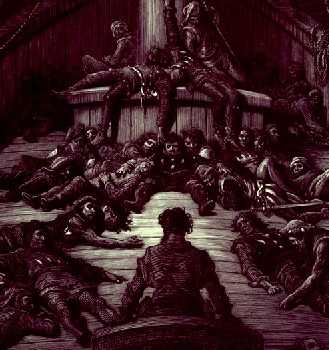
Artist: Gustave Doré
Men Asleep on Deck, From The Rime of Ancient Mariner (1876)
Physician William Cockburn spends quite a bit of time discussing the problem of Navy sailors imbibing in the evening, resulting in their falling asleep on their ship's deck. He explains that sailors, "being got drunk, and not being able to crawl back into their Hammocks, they spend the Night fast asleep upon the cold Deck, and contract those sicknesses, that attend an interruption of Perspiration"1. Although he doesn't specifically mention humor theory here, perspiration is one of the ways the body ejects unwanted humors, which is why sweating was considered a humor-based remedy. Cockburn elsewhere warns that "their lying on Deck; or betwixt Decks, when they are pretty warm after a Can of Flip; and the prest Mens real Want of Cloaths, they sensibly contract a cold, which is the beginning of most of their miseries."2
The problem of sleeping in the cold and its connection to humoral problems is interesting. In his description of a severe surfeit, Moyle explains that once unwanted food or drink "hath passed the Liver [it] makes bad blood and instead of making a third concoction laudible [referring here to the proper third stage of digestion which is supposed to produce urine and sweat], produceth Surfeit spots... [which are] got[ten] by unnatural heats and colds, by over Labour and Travel, which putrifies the blood, and often gives the same Symptoms"3.
Along similar lines, Cockburn notes that sailors who get drunk and sleep out on the deck produce a type of 'bad blood'. He notes that this is due to
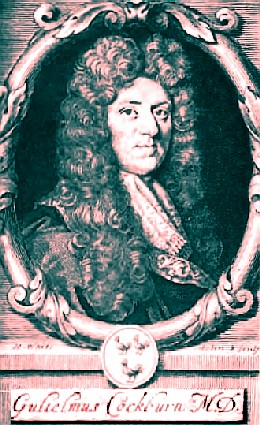
Sea Physician William Cockburn
their blood being full of the Spirits of this liquor... for the small parts of the liquor sooner break and divide the viscid [glutinous] parts of blood... the small parts of this blood are [then] set at liberty, and the heat [is] felt all over the body [after drinking], therefore when the perspiration is interrupted, and the blood [is] full of these Spirits, the attrition [reduction in effectiveness of the blood] and comminution [breakdown of the blood into small particles] will be sooner perform’d4
As a result, Cockburn says the patient quickly comes down with a fever, much more rapidly than he normally would had the cold been the cause of a normal fever.
French surgeon Ambroise Paré also discusses humor-caused problems which result from over-indulgence.
[W]ine, although it be by faculty and nature, hot, and dry [referring to its humoral properties - everything in nature was believed to have a humoral basis], yet taken too immoderately it accumulates phlegmatick humors [yellow bile], and causes cold diseases. Therefore drunkenness, gluttony, crudity, bathes and exercises presently after meat [eating food - 'meat' is used generically here], being they draw the meats [food] as yet crude into the body and veins; and to conclude, all things causing much phlegm [yellow bile] in us may beget a Quotidian feaver.5
Paré comments call Moyle's explanation of surfeits to mind. (Paré's book does not use the term surfeits, but there are clear parallells between his and Moyle's description of the problem.)
Sea-surgeon Moyle explains that a severe surfeit is apparent "When the Patient complains with intolerable Head-ach, and Vomits frequently, Cholerick humours [vomits yellow bile], and has a hot Fever,
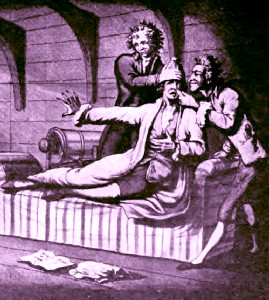
From The British Tar in Fact and Fiction, p. 244 (1800)
and covets cold Drink."6 Paré says the symptoms of his fever include "pain of the mouth of the stomack, because that phlegm is commonly heaped up in this place, whence follows a vomiting, or casting up of phlegm; the face looks pale, and the mouth is moist... because the stomack flowing with phlegm, the watery and thinner portion thereof continually flows up into the month and tongue"7. Although these authors do not give this problem the same name, Moyle's, Cockburn's and Paré's comments all suggest that overindulgence in food and/or liquor combined with over-exposure to the cold will eventually result in a fever because the blood humor has been tainted and an excess of yellow bile is being created during digestion.
Moyle recommends the treatment for a severe surfeit which include several humor-based health cures such as clysters (enemas), phlebotomy (blood-letting), sweating and emetic purges. He recommends that the surgeon use a medicine that will "not only Eradicate the humour upwards, but both ways."8 By which he means medicine that cause vomiting, urination and excretion. In addition, Moyle recommends some cordial drinks, including white-wine-based poppy water and a rather complex concoction with a sack wine base. Of the poppy water, he advises taking "four Spoonfuls of this every two hours, or as often as occasion requires."9 Of the second cordial, he says, "Let it be drank when the Patient is faint, and let him have an Orange in his hand to smell to, and to suck the juyce of."10 It is curious that he recommends alcohol-based medicines to treat this often alcohol-based problem.
1 William Cockburn, The Diseases of Seafaring Peoples, 1696, p. 71-2; 2 Cockburn, p. 26; 3 John Moyle, Chirugius Marinus: Or, The Sea Chirurgeon, 1693, p. 224-5; 4 Cockburn, p. 72; 5 Ambroise Paré, The Workes of that Famous Chirurgion Ambrose Parey, 1649, p. 216; 6 Moyle, p. 225; 7 Paré, p. 216; 8 Moyle, p. 226-7; 9 Moyle, p. 227; 10 Moyle, p. 228
Alcohol and Health - Detrimental: Alcohol, Illnesses and Health Problems
Several of the medical authors link alcohol use to certain illnesses and health problems. French military surgeon Ambroise Paré identifies several health problems ranging from inconvenient to chronic which he believed
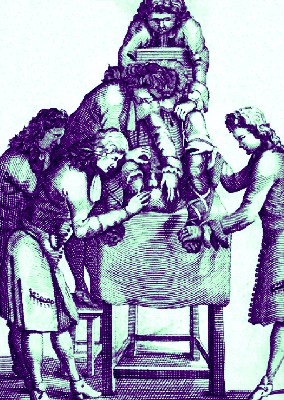
Performing a Lithotomy (Removing a Kidney Stone), From
A Treatise of lithotomy, By Francois Tolet (1683)
could be caused by drunkenness and gluttony. These include migranes1, cramps or flatulent convulsions2, gout3, and leprosy4. Of these four health problems, only two bear further examination. Modern medicine says that migraines can indeed be triggered by all types of alcohol consumption.5 Gout attacks can similarly be triggered by drinking alcohol6, although alcohol doesn't actually cause the disease.
Thomas Tryon suggested that alcohol caused kidney stones, gout, palsies, fevers and tuberculosis.7 He blamed these health problems on "the frequent drinking of strong, hot, sharp, intoxicating stale Liquors, and fiery prepared Drinks, as Beer high boiled with Hops, Brandy, Rum, old Wines, especially Claret and Whitewine"8. Gout and fevers have already been discussed. Tuberculosis is not caused by alcohol consumption, it is caused by bacteria, something not understood at this time.
Tryon focuses particularly on the link between alcohol and kidney stones, explaining that such beverages "contract and generate in the Passages and Ureters a hard gritty Substance, and of a mixt Saturnine Martial Nature [basically hot and sharp], which is the first principle and beginning of the Disease called the [kidney] Stone, and all its Symptoms; and Attendances."9 Not surprisingly, Tryon provides a humoral basis for his theory, explaining that the blood is 'infected' with the same 'hot' quality he ascribed to certain alcoholic beverages which limits circulation and allows parts of the body to overheat and cause the problems listed. Today we know that kidney stones can be composed of different materials, although those caused by diet are usually calcium-based. Calcium kidney stones have a variety of causes but alcohol is not generally recognized as being one of them.10
Sea surgeon John Woodall said that dysentery could result from "little drinking of beere or ale, and sometimes it commeth by drinking too much wine, and by eating of costive meats [food which causes constipation], and superabundance of choler adust [the humor black bile]."11 While not strictly accurate, diarrhea can indeed be caused by drinking heavily.
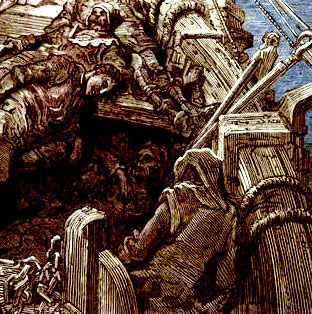
Artist: Gustave Doré
Ill Men on Deck, From The Rime of Ancient Mariner (1876)
Fellow sea surgeon John Atkins advised that "All strong Liquors and Sugars contribute a great Share in that Endemical Disease the Scurvy, tainting the Breath and rotting the Teeth... Nature kindly forwarning us by the Head-achs, Indolence and sick Stomachs, created on our Indulgence and Satiety"12. (Notice that most of the symptoms he lists and their cause actually sound more like Moyle's surfeits than they do scurvy.) The connection between scurvy and alcohol is, of course, completely wrong; scurvy is caused by a lack of vitamin C.
Physician Tobias Venner warned that "drunkennesse, besides that that it doth extinguish the light of the understanding, causeth the Apoplexie [cerebral hemmorhage or stroke], and such other like diseases of the braine, and oftentimes a sudden suffocation."13 Sea surgeon Atkins suggests the same thing in the quote at the top of this page. They actually have a point here. A modern suggests that while moderate drinking can reduce the risk of one type of stroke, heavy usage increases the risk of other types. The study's lead author, Dr. Susanna Larsson, notes that "heavy drinkers were about 1.6 times more likely to suffer from intracerebral hemorrhage [a blood vessel bursting in the brain] and 1.8 times more likely to suffer from subarachnoid hemorrhage [a ruptured aneurism or vascular tumor in the brain]."14
In a case study on the treatment of an ulcer of the inner ankle of a patient, sea surgeon John Moyle mentions alcohol use as being part of a strategy to make its cure more effective. Moyle notes, "I forbid him strong Drink especially Brandy; which he was much addicted unto, and ordered him to drink only Small Beer, and eat fresh and wholesome Diet."15 Moyle's usual commonsense approach is borne out in present day research. "A 2013 study from the National Institute of Public Health at the University of Southern Denmark confirmed that binge drinking has a direct, negative impact on the post-surgical healing process."16 The study found that problems occur in healing wounds because of damage the immune system, increased risk of bleeding and impairment in the patient's judgement, making them less likely to properly care for the wound.
1 Ambroise Paré, The Workes of that Famous Chirurgion Ambrose Parey, 1649, p. 401; 2 Paré, p. 464; 3 Paré, p. 456; 4 Paré, p. 500; 5 Alessandro Panconesi, "Understanding Migraine: Alcohol and Migraine", americanmigrainefoundation.org, gathered 2/15/17; 6 Tuhina Neogi , et al. , "Alcohol quantity and type on risk of recurrent gout attacks", American Journal of Medicine, April 2014, p. 311-8; 7,8 Thomas Tryon, A New Art of Brewing Beer, Ale and other Sorts of Liquors, 1691, p. 11; 10 Mayo Clinic Staff, "Kidney stones", mayoclinic.org, gathered 2/15/18; 11 John Woodall, the surgions mate, 1617, p. 242; 12 John Atkins, The Navy Surgeon, 1742, p. 320;13 Tobias Venner, Via Recta ad Vitam Longam, 1638, p. 42-3; 14 Ana Sandoi, "How does alcohol affect stroke risk? Study investigates", www.medicalnewstoday.com, gathered 2/15/17; 16 "How Drinking Alcohol Can Negatively Affect the Healing Process", www.advancedtissue.com, gathered 2/15/17

